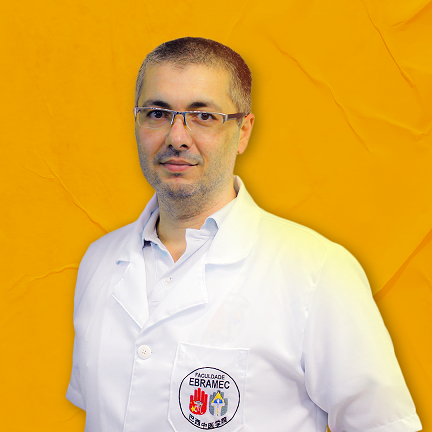PhD on Acupuncture from
Shandong University of Chinese Medicine
Brazilian College of Chinese Medicine

Presenter/Author:
Reginaldo Silva-Filho
Other Author:
NA
Author Affiliation:
Brazilian College of Chinese Medicine
Keywords:
Acupuncture; Herbal Medicine; COVID-19
Abstract:
Since the beginning of the COVID-19 pandemic, unfortunately, Brazil had over 681.000 deaths with more than 34 million cases. Brazil registered the first case of the new coronavirus SARS-CoV-2, which caused the covid-19 disease, on February 26, in São Paulo. The infection then spread to all states.
As long as the sanitary emergency was declared in Brazil, Faculdade EBRAMEC started to share free information on Chinese Medicine, promoting its knowledge and clinical possibilities. It was through Live talking throughout social media and also through our E-learning platform, including, over 200 free Live presentations, 1 hour each; 5 free 3-hour Masterclasses. More than 50 YouTube videos and over 30 free Qi Gong online classes, 1 hour each, were conducted. A specific means of communication was also established to help patients and professionals, completely free of charge. From March 2020 to July 2022, more than 500 requests for clinical assistance and guidance were received via a dedicated email.
Tele-healthcare actions by Chinese Medicine were proposed based on some pillars: recommendation of acupoints for application of Acupressure and for using Moxibustion sticks; suggestion of Chinese Herbal Formulas; presentation and indication of Qi Gong practices.
It shall be mentioned that before any therapeutic approach was suggested, patients were interrogated and had to submit pictures of the face and tongue. Under different conditions, the patient was required to schedule video virtual consultations.
In addition to the demand from patients, we also supported professionals who were not aware of how to help their patients from a distance. In this way, professionals were asked to send as much information as possible about their patients so that these could be analyzed, and evaluated in search of the Chinese Medicine Diagnosis. Then a treatment proposal was established. This form of healthcare was developed because there was a need to maintain the treatments. Even without the possibility of the presence of patients in private clinics and, even in hospitals, there was a very great demand for COVID, which made acupuncture treatments unfeasible. A follow-up carried out randomly with different patients showed that their satisfaction was very good or excellent for more than 80% of the cases.
We conclude that tele-healthcare in Chinese Medicine is a reality with no return and that professionals must be better prepared to know how to act with this growing demand.
Reference:
The Acupuncture and Telehealth Survey: A Cross-Sectional Survey Exploring Early COVID-19 Impacts on the Acupuncture Profession. J Integr Complement Med. 2022 Jan;28(1):36-44.
Intra-Rater and Inter-Rater Reliability of Tongue Coating Diagnosis in Traditional Chinese Medicine Using Smartphones: Quasi-Delphi Study. JMIR Mhealth Uhealth. 2020 Jul 9;8(7):e16018.
Funding Source:
N/A
Conflict of Interests:
The authors report no conflicts of interest related to this study.
Dr. Reginaldo Silva-Filho is the Founder and President of Faculdade EBRAMEC (Brazilian College of Chinese Medicine). He is a PhD on Acupuncture from Shandong University of Chinese Medicine where he researched on the use of Acupuncture for Shoulder pain under the tutorship of Prof. Gao Shu Zhong. Dr. Reginaldo is an Associated Professor of World Federation of Chinese Medicine Societies and a Guest Professor of different Chinese Medicine Universities in China, including Chengdu, Shandong and Zhejiang. He is author of more than 25 books on Chinese Medicine, including the translation of some important Chinese Medicine Classics. He is the Editor in chief of the Brazilian Journal of Chinese Medicine, which is an open access online journal in Portuguese.